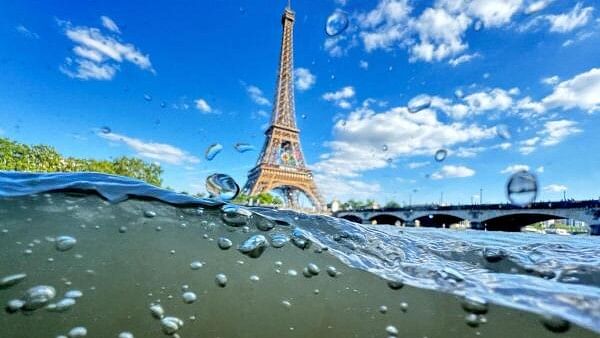
Eiffel Tower seen from the water of the Seine river
Credit: Reuters File Photo
Paris: The River Seine will be a central element of the Paris 2024 Olympics, with the opening ceremony taking place on the river with a boat parade and two events, the marathon swimming and the swimming leg of the triathlon scheduled to be held there.
However, pollution levels in the Seine have raised health concerns for athletes.
Where do we stand now?
The monitoring group (State and City of Paris), based on Eau de Paris water analysis, publishes weeekly results. The first three bulletins for the month of June showed the water quality was insufficient to allow bathing. The latest data published on Thursday, however, showed that the river was suitable for swimming six out of nine day between June 24-July 2.
What are the conditions for the river to be suitable for swimming?
Testers measure the level of two bacteria - E. coli (Escherichia coli) and Enterococcus faecalis.
According to European standards, the safe limit for E. coli is 900 colony-forming units (cfu) per 100 millilitres while the threshold for Enterococcus is 330 cfu/100ml.
Which factors influence the water quality?
According to Benjamin Raigneau, Director of Water Quality at the Paris city hall, four main factors have an impact on water pollution.
- Rainfall. More rain more pollution runoff.
- UV index. "The higher the UV index, the faster the bacteria die," said Raigneau.
- Temperature. The higher the temperature, the faster the bacteria dies. "Whether the temperature of the water is 16 degrees Celsius (60 Fahrenheit), or above 22 Celsius (71 Fahrenheit) like it usually is in the summer, it makes a significant difference," said Raigneau.
- The flow of the river. The faster the flow the higher the pollution.
What has been done to improve the quality of the water?
The city of Paris built a storage basin capable of holding 46,000 cubic metres of waste water to significantly reduce the risks of pollution of the Seine.
Once the rain water is collected in the Austerlitz basin - a monster, 30-metre (98-feet) deep structure the size of a dozen Olympic swimming pools - it will flow through a tunnel to a treatment plant. When the water meets the required health criteria, it will then be poured into the Seine.
How is the decision to allow swimming made?
Every afternoon the day before each familiarisation session (athletes' swim) and before each competition, a technical committee meets, bringing together all the players involved in the issue of water quality in the Seine (City of Paris, Paris 2024, the International Federation, regional authorities, Meteo France.
At the end of this technical committee meeting, an initial analysis is made of the weather conditions.
At 3.30am on the day of the competition, a final meeting is held with all the players involved.
Who makes the decision?
The International Federation involved in the sport.
What if the water is not suitable for swimming on D-Day?
"There are contingency days planned for the summer of 2024 for both sports, which will give us some room for manoeuvre," organisers told Reuters.
"Furthermore, the decision-making process will be more refined and precise than ever, as the Eau de Paris laboratory will be analysing the water twice a day."
If, despite the postponements, the competition cannot take place, the marathon swimming event will take place at the reserve site of Vaires-sur-Marne, where rowing and canoeing events are held, and the triathlon will be turned into a duathlon.